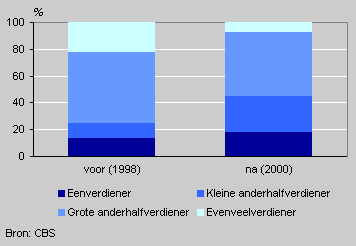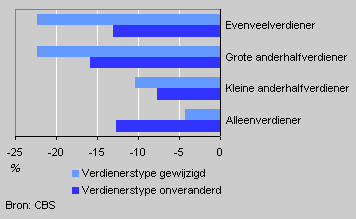Changing prosperity around family formation

The prosperity of couples who had children at the end of the last century diminished by much more than that of couples who remained childless. On average couples who had their first baby between 1998 and 2000 became 18 percent less prosperous, while the prosperity of couples without children rose by just over 1 percent.
This means that prosperity decreases by one fifth at the moment the first child is born. This prosperity dip has been established in a study conducted jointly by the Netherlands Family Council and Statistics Netherlands.
Couples incomes before and after the birth of the first child

Partners contribute differently to income after first baby
In many households the contribution by the two partners to total income changes after the birth of the first child. In nearly one quarter of one-income couples, the non-working partner goes to work after the birth of the first child. In dual income couples where the woman earns more than a third but less than two-thirds what her partner earns, one third of partners cut back their working hours. The most drastic changes occur in couples who contribute equally to household income before the birth of their first child: the contribution to household income changes for 91 percent of these couples.
Change in prosperity after shift in income contribution

Decrease correlates with changing contributions
If there is no change in the contribution by the partners to household income, one-income couples will become 13 percent less prosperous after the birth of their first baby. Prosperity of dual income households where the woman earns less than one third of her partner’s income will be reduced by 8 percent, while those in which the woman earns more than one third but less than two-thirds of her partner’s income will be reduced by 16 percent. Couples who contribute equally to household income will lose 13 percent of their prosperity.
If there is a change in the contributions by the two partners, one-income couples lose only 4 percent, dual income couples in which the woman earns more than one-third of what her partner earns and equally contributing couples will lose 22 percent. Only dual income couples in which the woman earns less than one third of her partner’s income who change the contribution ratios after the birth of their first child lose more income than they if they had not changed at all.
Erna Hooghiemstra (Netherlands Family Council)